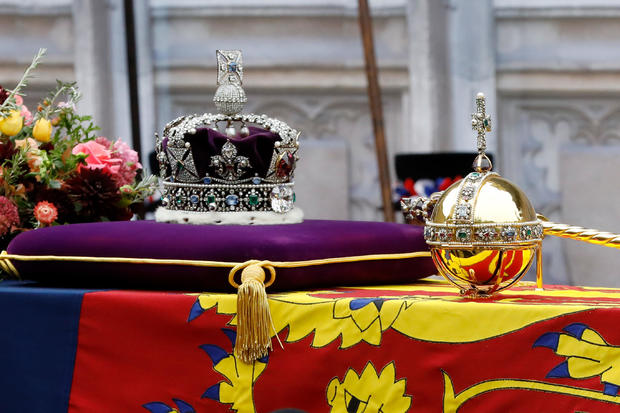Queen Elizabeth II made her final procession through London on Monday after the state funeral service was held for her at Westminster Abbey. Throughout the process, her coffin was heavily decorated in regalia, all representing various aspects of the queen’s life and legacy. Royal contributor Tina Brown told CBS News that the items that draped and sat on top of the queen’s coffin added historic symbolism to this “moving moment.” “It’s really the last time we get to wrap Elizabeth in the splendor of the nation’s pageantry,” she said. “You know, this is the last time. It’s a thousand years of British history — its whole weight — on the move.”
Here are the items that decorated the queen’s coffin, and what their significance to the throne is.
The Royal Standard
Queen Elizabeth’s coffin was draped in the Royal Standard, a flag representing the Sovereign and the United Kingdom. The flag — whose design contains three lions passant for England, a rampant lion for Scotland and a harp for Ireland — is traditionally flown when the queen was in residence at one of her palaces and when she was on an official journey in her car or on her aircraft. “It has a very powerful religious element in this,” former BBC royal correspondent Wesley Kerr told CBS News on Monday.
Imperial State Crown
Atop the Royal Standard, and standing out among the other items, is the Imperial State Crown. The crown, worn by monarchs as they leave their coronations, was made for the coronation of Elizabeth’s father, King George VI, in 1937, according to the website for the Historic Royal Palaces. It replaced one worn by Queen Victoria, who reigned from 1837 to 1901.
The crown, made of gold, holds 2,868 diamonds, 17 sapphires, 11 emeralds, 269 pearls and 4 rubies. Its gems include the St. Edward’s Sapphire, which is said to have been discovered in the tomb of St. Edward the Confessor in 1163. The pearls on the crown belonged to Queen Elizabeth I, Kerr said, marking “an incredible link with history.”
Sovereign’s Sceptre and Orb
Sitting alongside the crown are the Sovereign’s Sceptre with Cross and Soverign’s Orb, “symbolizing her relationship with God and also power,” Kerr said. According to Historic Royal Palaces, the sceptre has been used at every coronation since 1661. The Cullinan I diamond — the world’s largest colorless cut diamond, originally discovered in South Africa — was added to it in 1910 for George V. That diamond and eight others were cut from the original stone, with its sibling stone, the Cullinan II, being placed in the front band of the Imperial State Crown. The orb is also a significant object that is given to monarchs for their coronation to represent their power and responsibilities, according to the charity. The gold orb, Historic Royal Places says, “reminds the monarch that their power is derived from God.”
A note from King Charles III
While most of the items on Elizabeth’s coffin were regal and historic, one stood out for its personal nature — a handwritten note from the queen’s eldest son, Britain’s newest monarch, King Charles III. The note was nestled atop a beautiful wreath of flowers that included a sprig from Queen Elizabeth’s wedding to Prince Philip, her husband of 73 years, who died in 2021. “In loving and devoted memory. Charles R.,” the note says, with R. being shorthand for “Rex,” the Latin word for king.
This article was first published in CBS News . All contents and images are copyright to their respective owners and sources.












